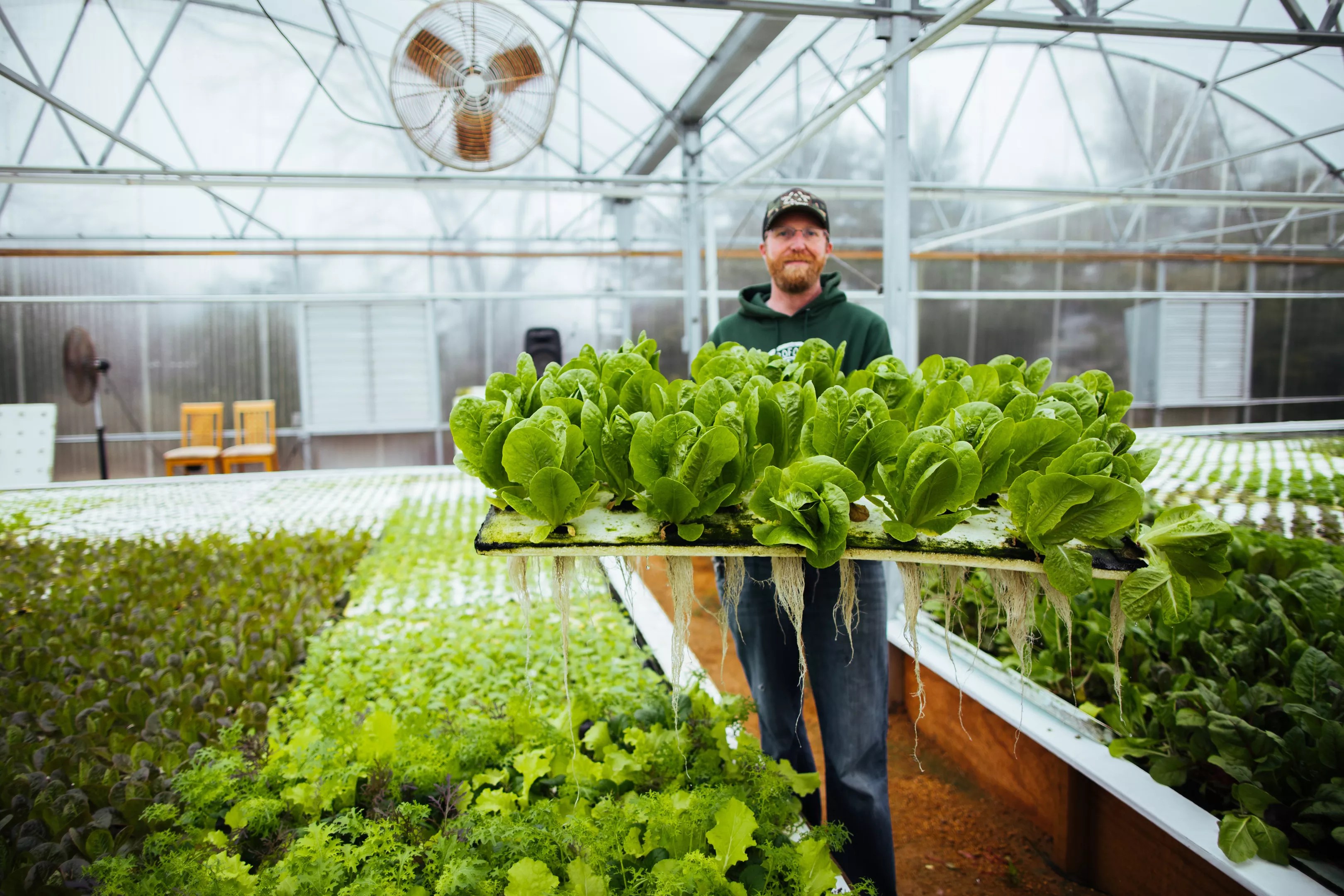
Kathy Tran

Audio By Carbonatix
It’s possible your favorite restaurant has a little “provided by” section on its menu and “Profound Microfarms” is listed there.
If so, that’s because Jeff Bednar decided a few years ago to leave his job in real estate and start growing things. Many of the top restaurants in Dallas get their produce from local providers, and more than 60 of those get weekly deliveries from Bednar’s Profound Microfarms.
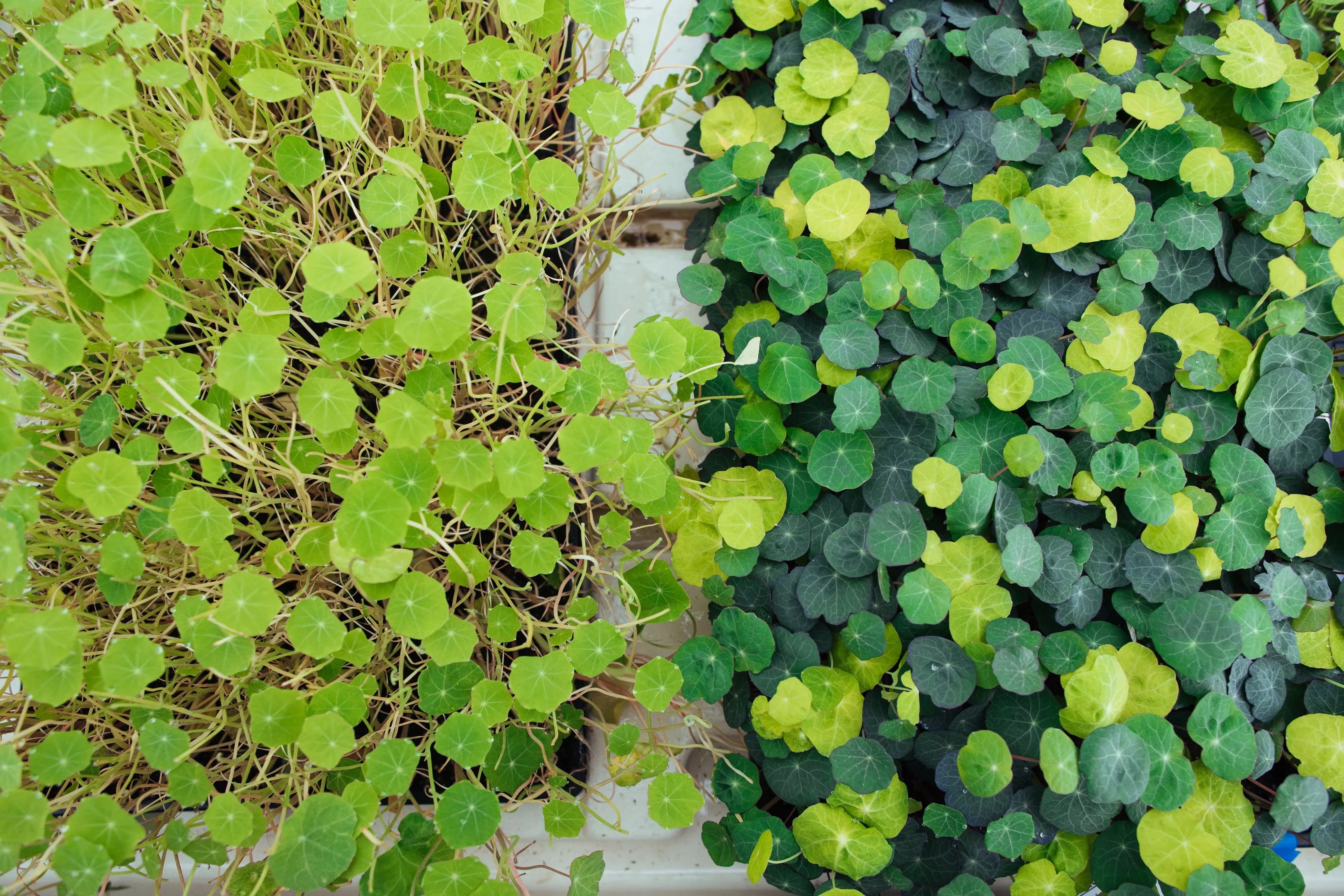
Nasturtia growing freely
Kathy Tran
This farm in Lucas is known so well throughout the industry, it’s hard to remember that customers might not be aware it exists. But you know its work: delicate nasturtia that top a dish, red-veined sorrel that completes a plate or wasabi arugula that makes you wonder what you just ate.
“Jeff has always done a great job of listening to chefs and growing what we want. It’s pretty much that simple,” says chef Matt McCallister of Homewood restaurant in Oak Lawn.
That’s a simple take on it, but for Bednar, getting to the point of providing 128 chefs with fresh microgreens required a lot of learning.
“We bought the farm at the very end of 2014, so it’s been 5½ years, and then it took me about three years to figure out how to grow; I never had a houseplant before we moved to the farm,” Bednar says. “So I became a master gardener.”
Bednar, with wife Lee, started Profound after selling their 3,600-square-foot home in Allen and purchasing a former nursery about 45 minutes north of downtown Dallas.
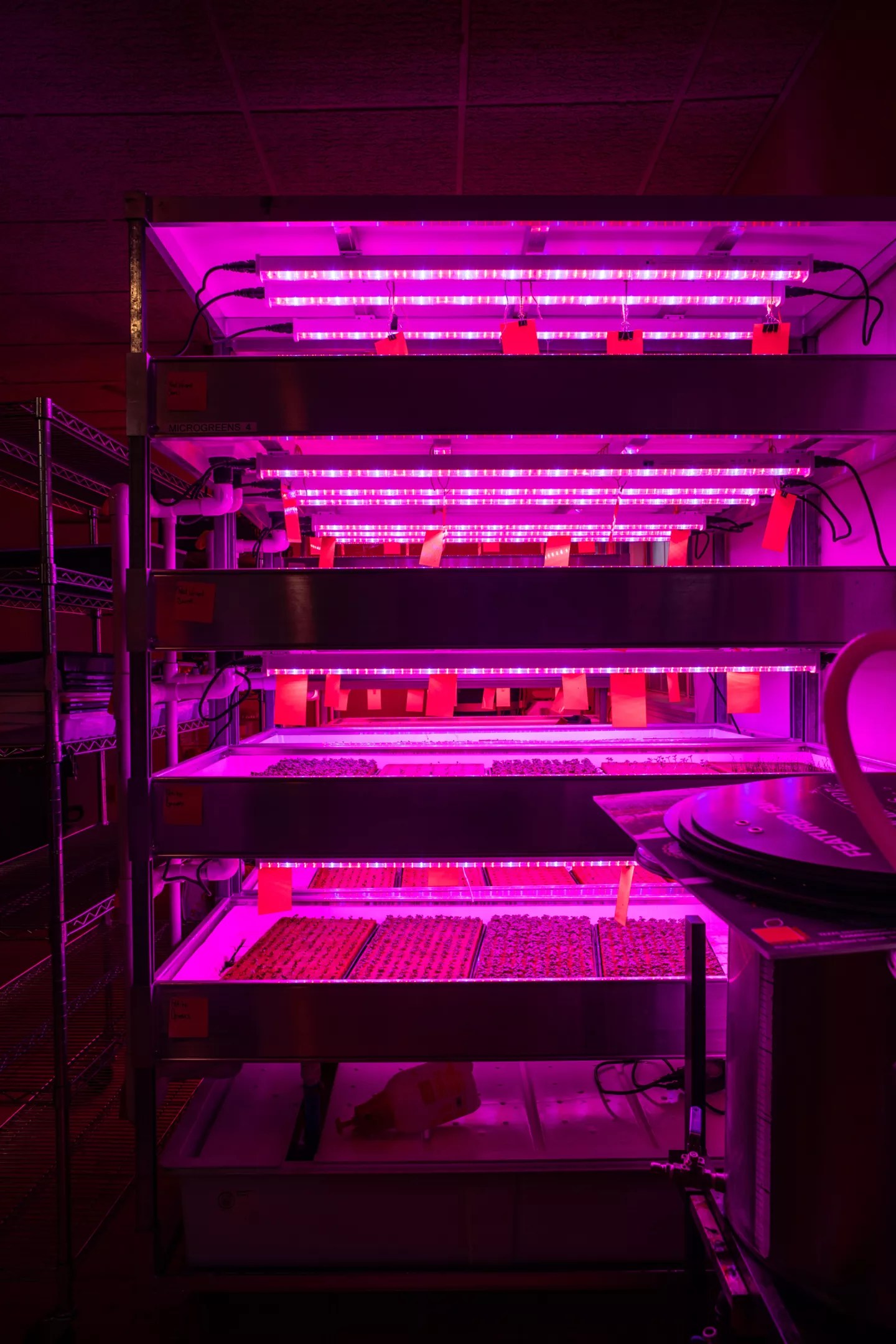
When they started germinating plants under these lights, it cut the total time to harvest by a week.
Kathy Tran
“We wanted to go to something more environmentally friendly,” Bednar says. “It was really kind of a big lifestyle switch. … We had a little bit more time, and I wasn’t working, so we were starting to find farmers markets, we started to eat a little differently.
“A lot of things changed, income and living space allowed us to really focus in on what we really cared about. We got rid of a lot of our stuff … 90% of our furniture we got rid of.”
While they focused on keeping what matters, they continued to develop a focus for their soon-to-be-growing farm.
“The overall narrative for us is environmental sustainability,” he says. “It’s the biggest single problem we have as a human race.”
He wasn’t working, but the money from his previous home and the lower cost of living on the 2.5-acre property in Lucas leveled out.
“Even if it didn’t work out it would still be OK,” he says.
Where a chef might previously have needed to go from provider to provider to find the ingredient they need, Jeff Bednar and his other farm partners generally have it. In Bednar’s case, if he doesn’t have it, he can start growing it.
Even with financial stability, they didn’t just throw seeds and expect to sell tiny plants to restaurants immediately.
“The first three years, there was a ton of failures,” Bednar says. “There [were] many, many times when I killed everything in the greenhouse.”
And that everything in the greenhouse wasn’t quite nasturtium yet.
“My original intention was to sell to consumers. We were going to do a subscription salad club. I had a buddy in Paris, Texas, who did it, grew it, turned it into salads,” he says.
Then he got a call from McKinney chef Robert Lyford, who asked for a farm tour with one of his chef friends.
“He showed up with his kitchen crew, Matt McCallister showed up with his [FT33] kitchen crew,” Bednar says. “When they got here, they were like, ‘Listen, if you can grow chives, nasturtium and celery, we’ll buy all you can do.'”
That was in the summer of 2017, when everything started changing.
“I had made zero Dallas deliveries until that date,” Bednar says. “The first time I drove to FT33, I was literally bringing (in) $22 for a 2½-hour trip. … We saw that we would need to scale.”
Today, the farm produces about three times as much as it did in 2017, and now you can walk through the grounds and see what all that means.
On a recent visit, the rainy morning made the smell of stew on the stove enticing. It filled the kitchen that also houses the start of nearly everything that grows here: Red and blue lights flood racks of petite greens that are just beginning to germinate. In the corner is a 20-gallon home brewing system where Bednar and his father will soon tap an Oktoberfest brew.
Bednar, wearing a hat bearing the brand of East Dallas restaurant Petra and the Beast, says when he walks outside after being among the lights for a while, everything has a strong green hue.
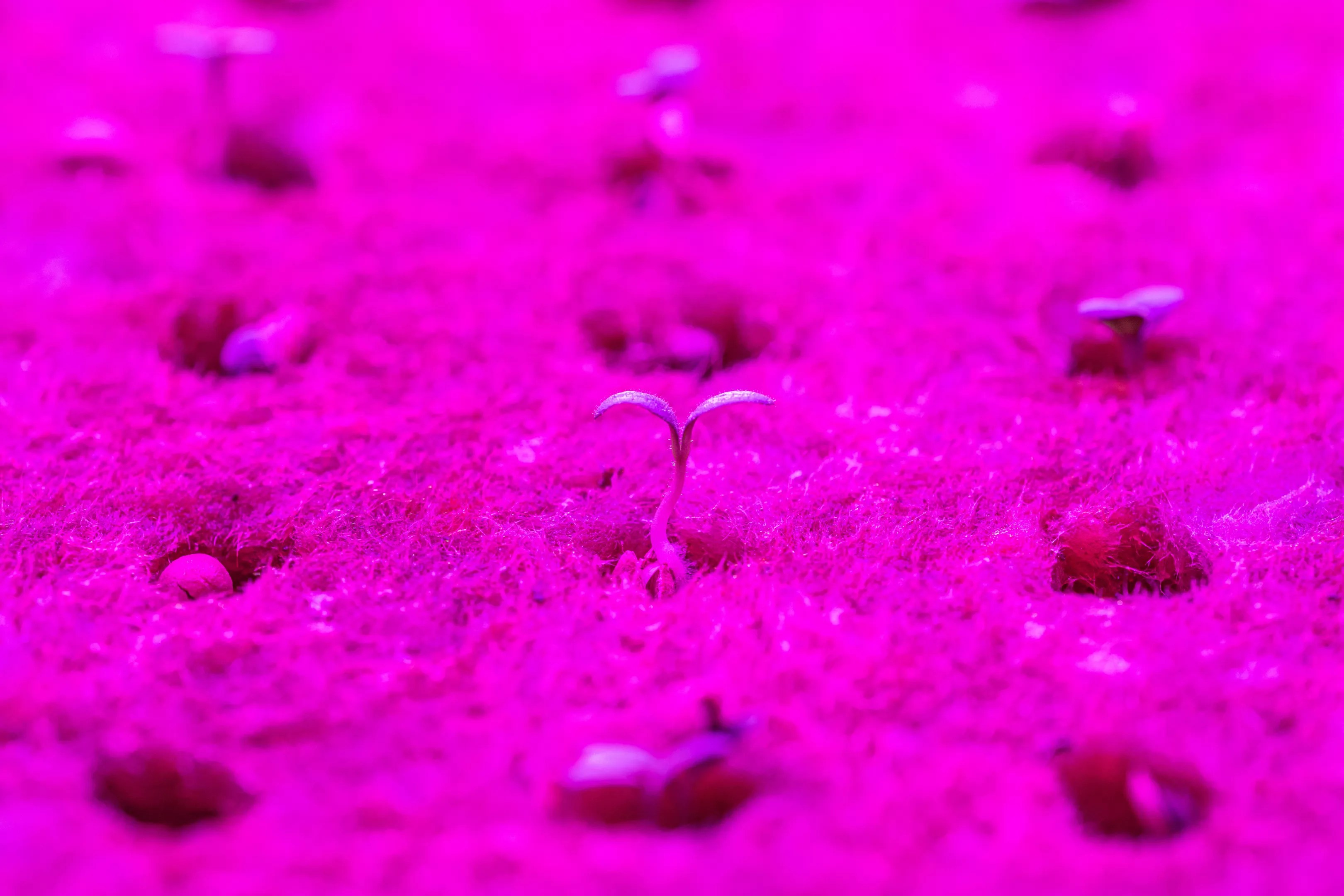
Nearly every plant grown at Profound Microfarm starts right here.
Kathy Tran
After sprouting, plants go to hydroponic growing, where Styrofoam flats with equally spaced holes allow a home for these plants to sprout, their roots growing in nutrient-rich water.
“This one’s fun: Have you tried the agastache before? It’s a ton of flavor for a little teeny flower,” he says.
It’s bright and juicy, like honeysuckle.
“When you’re eating the lettuce, his lettuce is like super-buttery and extra flavorful,” says chef Eric Freidline of Sevy’s. “And even the micros and the greens, the baby mustard – you take one bite of the baby mustard, and there’s some of it that can resemble the wasabi flavor, that’s pungent. That’s what sets it apart: I can order those same microgreens from any of the purveyors, and they’ll get it to me, but the flavor’s not even close.”
There’s a new greenhouse on the property, too – one that’s going to be fixed up to where it’s actually operable.
“We’re going to do more of the craft cocktail herbs over there: It’s going to be the Devils River Whiskey greenhouse. They’re giving us some whiskey barrels … on the tour there will be a stop there, then some of the barrels we’ll use to mix our nutrients,” Bednar says. “Their main goal was to meet chefs and be part of the community. … We’re going to move over some more of the cocktail-y stuff that we have, a lot of these flowers will be over in that greenhouse.”
Connections like these are one reason why Bednar has found success in microfarming. He started the business by attending conventions, one of which encouraged him to apply for grants.
“Eleven days later there was a deadline, so we applied for the USDA Local Food Promotion Program,” he says. “And that’s when we were awarded $500,000 over three years – that’s only for distribution.”
That’s what spurred Profound Foods, which Bednar also runs, to help 35 local farms distribute their goods to more than 60 restaurants.
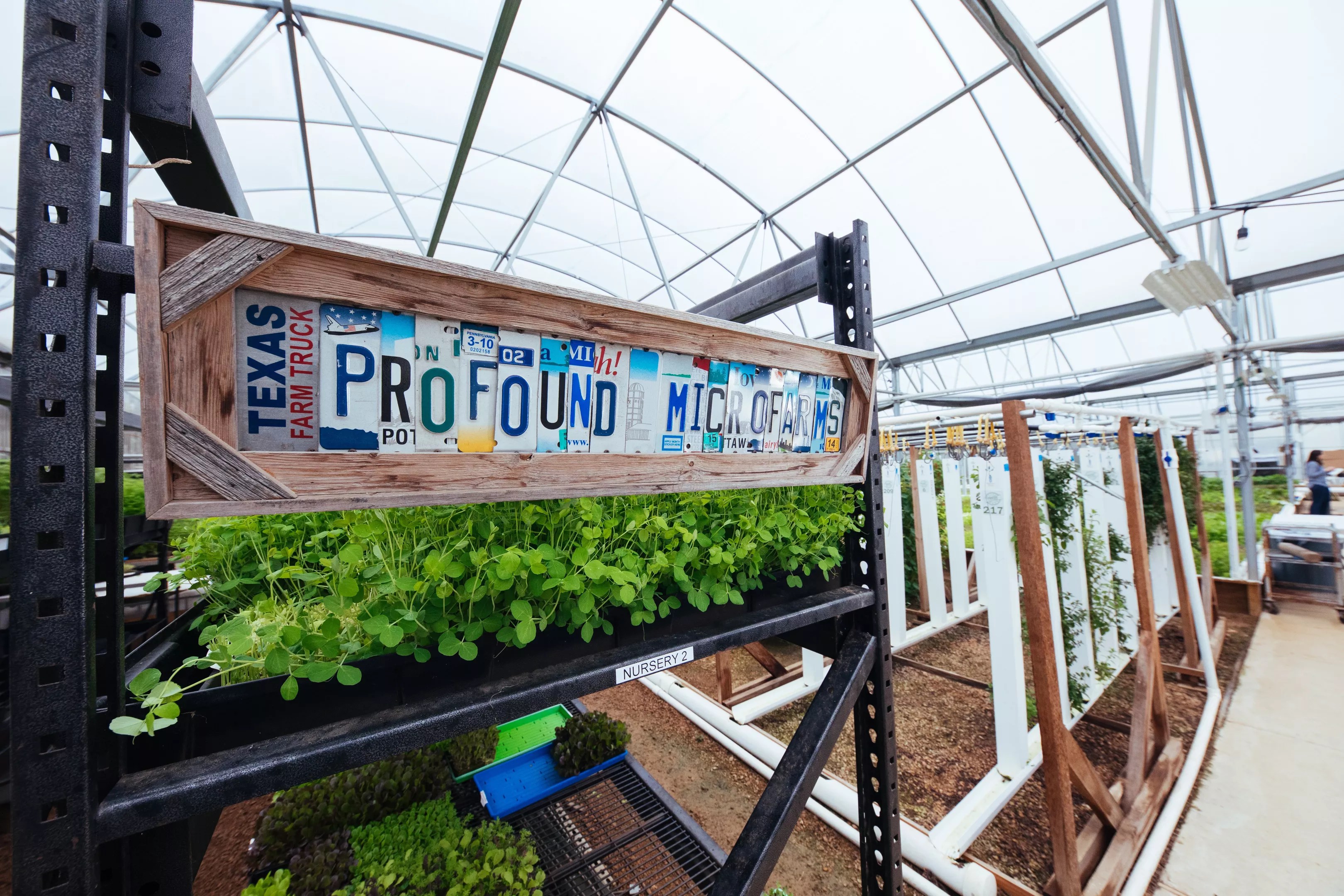
It took Jeff Bednar three years to learn how to grow plants well.
Kathy Tran
Where a chef might previously have needed to go from provider to provider to find the ingredient they need, Bednar and his other farm partners generally have it. In Bednar’s case, if he doesn’t have it, he can start growing it.
“Jeff Bednar with Profound has done an amazing job linking farms and restaurants and providing the metroplex with far more options than we previously had,” says chef Justin Holt of Salaryman. “Prior to Profound, farmers would have to grow, harvest, market and sell the product, taking valuable time away from tending the farm and inevitably limiting the range of how far a farm could travel with regularity. Profound has allowed restaurants to conveniently ‘shop’ for quality farmed local ingredients.”
Experimenting still goes on: Right now they’re drying produce for the first time for a local small business owner who wants to use it in skincare.
“We’ve never successfully grown spinach before. It’s a very difficult one to get germinated,” he says.
But his friends at Eden Green Technology in Cleburne are successfully growing it, and they’ve given him a flat, post-germination, to try.
“We’ve never gotten them this far; we failed constantly in the germinating: We could grow them in the soil gardens but never in the hydroponic,” he says.
“We’re giving them coaching on what they can grow, what chefs and restaurants can buy, it’s really all aspects.” – Jeff Bednar
Even if they get it down, it doesn’t make economic sense to bring to market, Bednar says, plus they’re still providing spinach through Profound Foods from Eden Green.
“It’s one of those, we failed at it every time, and I want to get it once, even if we use it in a family meal and never get it for sale, it’s a big deal.”
And that family meal happens regularly, spinach or no spinach.
“We have 10 employees and we feed them every day,” he says. “And we eat really, really well.”
After seeds germinate in those purple and red lights in the house, they’re moved to the Styrofoam flats that rest on circulating water in one of the three greenhouses, where harvesting happens Monday through Friday. Each flat looks a little more full than the one next to it.
“These are two weeks old right now,” Bednar says, his height looming over the flat containing new red-veined sorrel at the end. “They’ll be ready at four to five weeks.”
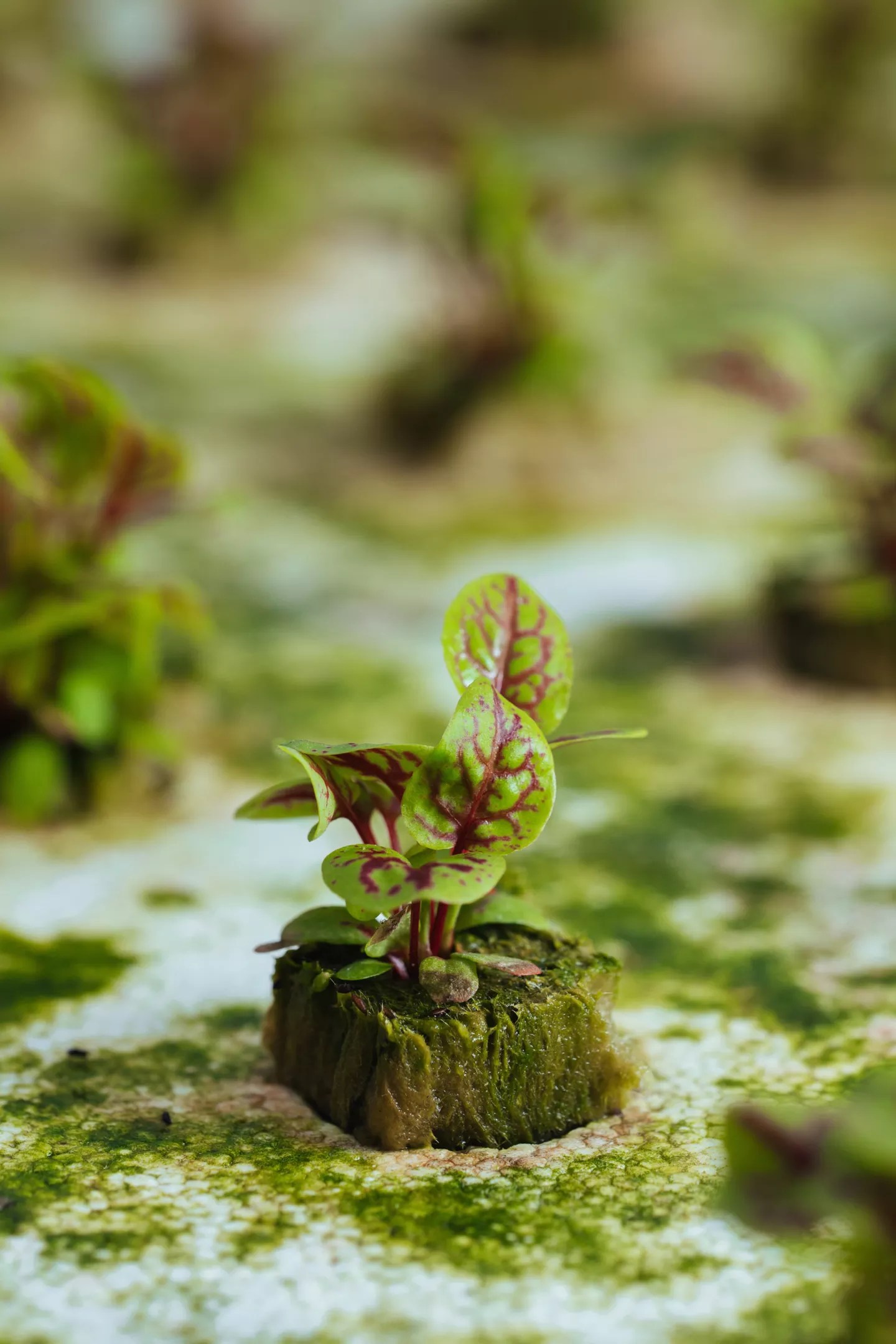
Red-veined sorrel, ready to grow
Kathy Tran
Walking through the greenhouses this time of year isn’t the prettiest opportunity, Bednar says, but plenty still thrives.
It’s not the most quiet place, either: You hear the gravel beneath your shoes as you walk the property, music blasting while employees release plants from Styrofoam and, if it’s raining, the lovely sound of a shower falling on the roof of the greenhouse.
You’ll also hear the quotidian task of power washing.
“What nobody ever tells you about being a hydroponic farmer is you’re going to spend like 40% of your time cleaning,” Bednar says.
Specifically, two hours a day power washing those trays the greens are on. They’re in a wet environment, one that’s meant to grow things – not cleaning can mean things you don’t want growing creating a home.
While they’re putting nutrients in the water, the atmosphere control in the greenhouse is mostly concerned with temperature.
“Down on the end over there,” he says pointing to a wall of the greenhouse, “is the evaporating cooling wall, so that will help cool the heat in the summertime, then there’s a big heater down on the end,” he says, pointing to the opposite wall. “We keep the air temperature, and what I’d like to do in the future is keep the water [maintained].”
Keeping the water temperature constant is more efficient, he says.
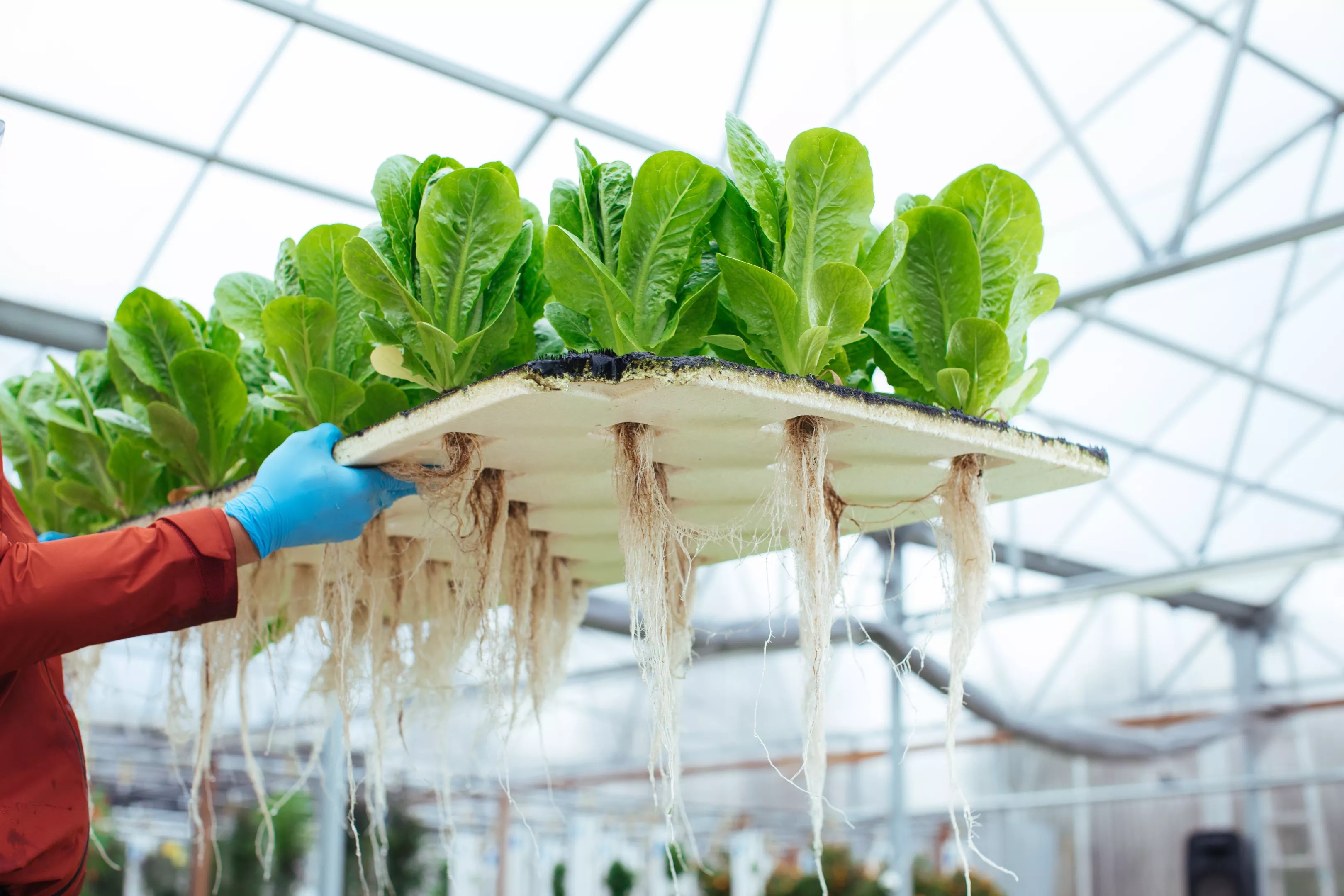
Roots hang after a flat is lifted out of the water.
Kathy Tran
Roots go deeply into that water: While a healthy bounty is on top, a long strand of roots extends below when you lift a flat up into the air.
“In there is basically a food grade liner, the wet material, so we build a box, put a liner in it, then little air stones pumping oxygen to the plant roots, then all of this is plugged into one system,” he says. “Then it’s probably using about $25 a month in electricity.”
Their water bill averages about $200 a month, “which is less than our neighbors with the giant houses,” Bednar says.
The future for this 2.5-acre lot is limited by that size alone, Bednar has other plans.
“We’ll definitely do something retail-purposed,” he says. “So then it’s collecting all these people: You can’t buy from us yet unless you support these restaurants.”
The other goals involve supporting other farmers, which Bednar can especially do through Profound Foods. Aside from literally providing transportation for their goods, the project has an educational element.
“We’re giving them coaching on what they can grow, what chefs and restaurants can buy, it’s really all aspects: The most important one is to help the profitability. A lot of farmers get into it for the passion and the love of it, but not the accounts receivable and marketing,” he says. “We are super-interested in helping everybody build relationships.”
Ben Shaw, who owns Texas Craft Wagyu with his wife, Grace, has worked with Profound Foods to take his business from working only with consumers at home to selling to chefs in restaurants.
“We went along with the deliveries with Jeff and went into the kitchens and met the chefs directly, gave out samples and answered questions,” Shaw says. “One of the things we like about working with Profound is we can keep our own identity and our own kind of way of doing things, then what Profound does and Jeff did, is he took us along to meet chefs. So they’re not covering over our brand and our identity and hiding us, we’re there front and center.”
Many chefs want many ingredients in smaller quantities, Bednar says, which makes their longer list of farmers advantageous for the kitchens. A restaurant makes an order, a supplier gets it ready, and Profound Foods picks it up and gets it delivered.
“Besides giving healthier food to people, it’s a way higher quality product,” he says. “Chefs can clearly see the difference … what 2-week-old lettuce from Mexico looks like versus 1-day-old lettuce.”
Seventy percent of those chefs using Profound Microfarms get weekly deliveries. One hotel receives $800 worth a week.
Another restaurant taking advantage of weekly deliveries is José on West Lovers Lane.
“We order two times a week. Having been to the farm several times, I know how much care and attention go into their product,” chef Anastacia Quiñones-Pittman says. “They take my dishes from looking good to great with just a mixed green or kale or blossoms.”
And that’s what Bednar’s about, whether he’s providing food from Profound Microfarms and getting products from other farmers to chefs through Profound Foods.
“Your experience of food is not just the flavor and taste of things, it’s the story of things; that’s why people eat at a lot of the places we provide to,” he says. “We have the ability of telling the farmer’s story.”
Profound Microfarms, 1020 W. Forest Grove Road, Lucas.
Many farms make Dallas food better every day. That’s why this is just the start of a monthly series where we’ll dive into the stories of how these farms came to be.
Restaurants using Profound Microfarms the most:
Homewood
Harvest
Virgin Hotels Dallas
Uchi Dallas
Fearing’s Restaurant
Five Sixty by Wolfgang Puck
Georgie by Curtis Stone
Texas Spice
The Lumen
Urban Taco
Bullion
Te Deseo
Petra and the Beast
Goodfriend Beer Garden and Burger House
Grand Hyatt DFW
FarmHouse Fresh
Gemma
Revolver Taco Lounge
Jose
Mercat Bistro
Billy Can Can
Knife
Imoto
Mirador
Scout
Hall Arts Hotel
Mot Hai Ba
Ida Claire
Komodo Loco
Our Farmlet
Village Hospitality
Local Yocal Farm to Market
Malai Kitchen
The Mitchell
Flatbread Company
Mariposa
Rye
Shamgar Ranch
Lucia
Will Call Bar
VA Table
Admirals Club
TeiAn
Patina Green
Sea Breeze Fish Market and Grill
Whisk Crepes Cafe
Jasper’s Uptown
Lockwood Distilling
Gab Designs